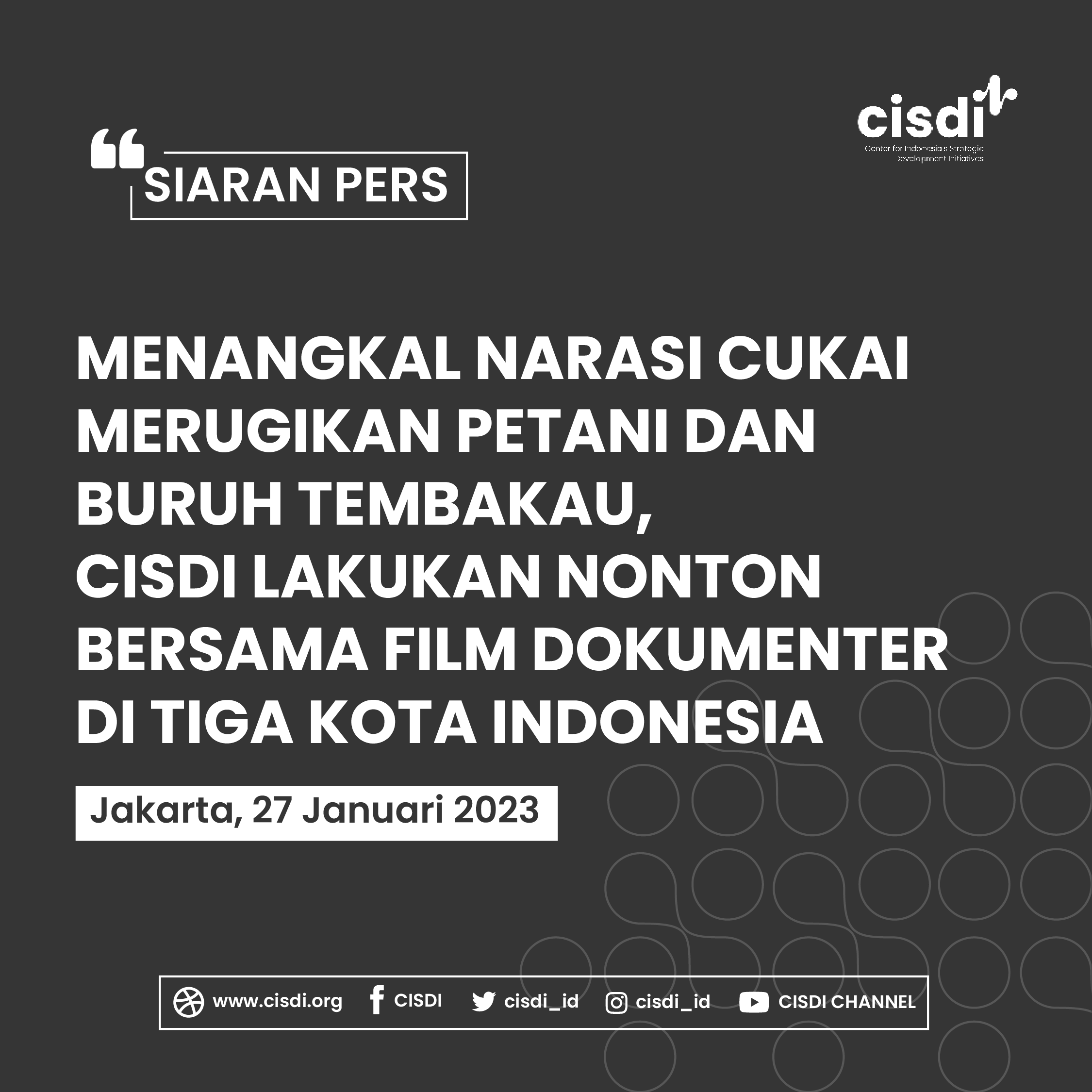
Press Release
Countering the Narrative of Excise Taxes Harming Tobacco Farmers and Laborers, CISDI Holds Documentary Film Screening in Three Cities
CISDI Secretariat • 26 Jan 2023
Jakarta, January 27, 2023 - The Center for Indonesia Strategic Development Initiative (CISDI) has just completed a series of roadshows screening the documentary film "Di Balik Satu Batang" in Medan, Solo, and Palu. This film presents a portrait of the reality of laborers and tobacco farmers in the cigarette business ecosystem and counteracts the opinion that tobacco excise will harm tobacco farmers and laborers.
CISDI collaborated with Yayasan Pusaka (Medan), Yayasan KAKAK (Solo), and Sikola Mombine (Palu) as local communities, and several activists on tobacco control issues. Not only a movie screening, CISDI, and the community also held a discussion to explore the conditions of tobacco farmers and laborers.
The pros and cons of excise tax increases always occur every year. The welfare of farmers and tobacco industry workers is always the reason for those who reject the cigarette excise tax increase. CISDI's Tobacco Control Project Lead, Iman Zein, questions this narrative. According to him, almost every year the Ministry of Finance consistently increases tobacco excise, but cigarette production has not decreased, instead it tends to increase.
"Last year, cigarette production in Indonesia increased by 7.27%. In 2020, Indonesia produced IDR 298.4 billion sticks, but in 2021 cigarette production rose to IDR 320.1 billion sticks. In fact, in that year the cigarette excise tax increased by an average of 12.5%. So where is the evidence that the industry will lose money if cigarette excise taxes are increased?" said Iman.
Iman revealed that the real problem faced by farmers is not the excise tax price.
"In the field, farmers complain about the unfavorable trade system. They do not have the freedom to determine prices. Not to mention the weather factor that sometimes makes farmers fail to harvest. So, their losses have nothing to do with excise. In fact, if allocated properly, the Tobacco Excise Revenue Sharing Fund has a good impact on farmers," said Iman.
The proof can be seen in the experiences of Sukiman and Istanto, two former tobacco farmers who are also interviewees in "Di Balik Satu Batang". Currently, with the help of DBHCHT funds, both of them no longer grow tobacco, and have switched to other more profitable commodities such as vegetables.
"The price of cigarettes continues to rise, but the price of tobacco leaves remains the same. This confuses the farmers. We also want to prosper. But in reality, there is a huge gap between the welfare of farmers and the industry," Sukiman said in the documentary.
In this documentary, Istanto said that farmers who later switched from tobacco to other commodities were actually more prosperous.
"There was a long drought. Many tobacco farmers lost money due to crop failure, and some even sold their farms. This anxiety ended when we switched crops. Unexpectedly, crops such as coffee and chili grown by local residents have become exportable," said Istanto.
Pak Sukiman and Iswanto's story is one example of the bitter reality of tobacco farmers and workers that is rarely known to the public, and the film "Di Balik Satu Batang" succeeded in showing the real conditions of tobacco farmers and workers to the public.
Appreciation was also expressed by the Chairperson of the KAKAK Foundation, Shoim Sahriati and the Coordinator of the Advocacy Division of Pusaka Indonesia, Elisabeth Juniarti, for this documentary film.
"Downstream we see the fact from the latest RISKESDAS data, the number of child smokers continues to increase to 9.1%. Meanwhile, upstream, this documentary has captured the fate of tobacco farmers and cigarette workers who are not yet prosperous. There are rights that are not fulfilled, such as health insurance and people's minimum wage. Many sectors should be responsible for solving this problem," said Shoim.
A total of 300 people attended the screening of the documentary "Behind One Stick" in three cities. Those who came were not only the general public, there were also government representatives, film observers, students, and communities.
At the end of the film discussion session, the Coordinator of the Advocacy Division of Pusaka Indonesia, Elisabeth Juniarti, said that there is still a lot of homework in the realm of tobacco control.
"It turns out that behind one cigarette is the real reality of the lives of tobacco farmers. There is still a lot of homework, especially in tobacco control policy, that must be completed. The involvement of multi-sectors is expected so that there will be no more mistakes in policy making," said Elisabeth.
-FINISHED-
About CISDI
Center for Indonesia's Strategic Development Initiatives (CISDI) is a non-profit organization that encourages the implementation of evidence-based health policies to realize an empowered, equal, and prosperous Indonesian society with a healthy paradigm. CISDI conducts advocacy, research, and program management to realize transparent, adequate, and equitable governance, financing, human resources, and health services.
For more information, please contact:
Amru Sebayang (Media and Communication Officer) - 087782734584
.png)